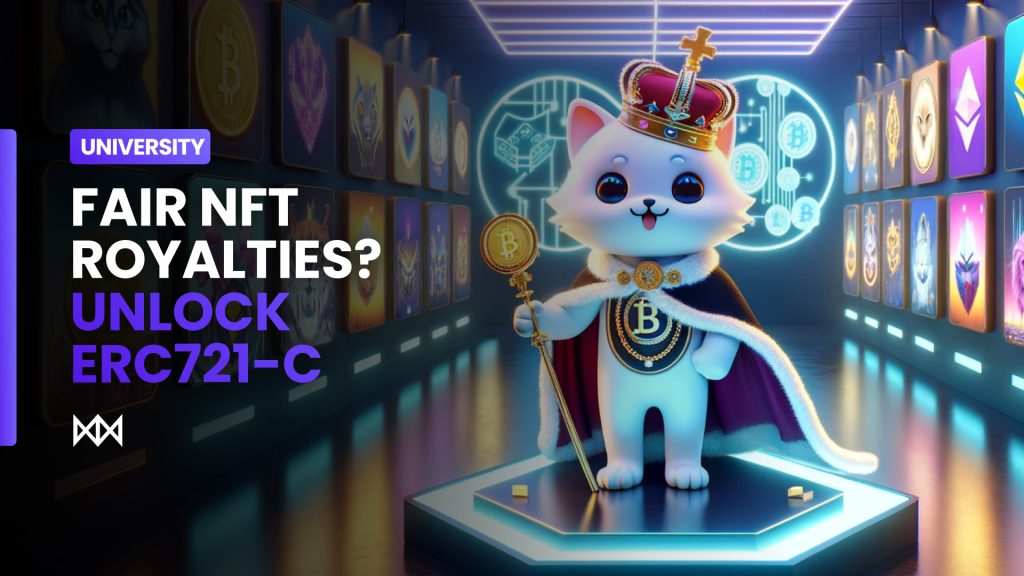A seemingly groundbreaking development has recently taken place with the introduction of ERC721-C in the world of non-fungible tokens (NFTs). Spearheaded by innovators @limitbreak and @gabrielleydon (their X.com handles), this upgrade aims to reshape the NFT space by addressing long-standing issues related to royalties.
ERC721-C is a new token standard designed to address limitations in the current NFT royalty system. It aims to provide more robust and enforceable royalty mechanisms, empowering NFT creators to retain greater control over how their work is valued and compensated.
Let’s delve into the key features of ERC721-C, exploring its potential impact on creators, holders, and the overall NFT ecosystem.

The State of Royalties
For years, royalties have faced challenges that hindered their effectiveness. Traders were reluctant to pay them, marketplaces often overlooked their importance, and many artists and founders hesitated to create without proper incentives. The prevailing sentiment was clear: the NFT community needed a solution that would align the interests of creators and holders while fostering a sustainable ecosystem.
Enter ERC721-C: Finally a fair royalties distribution?
ERC721-C introduces three major upgrades over traditional NFT standards, offering a ray of hope for a more balanced and incentive-driven NFT environment.
- On-Chain Royalties: One of the most significant enhancements is the on-chain implementation of royalties. This prevents marketplaces like Opensea and Blur from arbitrarily setting royalties to 0%, ensuring that creators receive their fair share for every transaction.
- Creator Influence on Token Trading: ERC721-C empowers creators to have more control over where their tokens are traded. This feature enables creators to curate and guide their NFTs through specific marketplaces, providing them with a greater say in the trajectory of their work within the broader NFT ecosystem.
- Programmable Royalties: Perhaps the most intriguing aspect of ERC721-C is the ability to program royalties. Creators can now set dynamic rules for when, where, and how royalties are transferred. This opens up a plethora of possibilities, allowing creators to tailor royalty structures to suit their unique needs and circumstances.
Creative and Incentive-driven Possibilities
The programmability of royalties under ERC721-C introduces a new realm of possibilities for creators and holders alike. Some notable use cases include:
- Rewarding early believers with royalties for the first few sales.
- Tailoring royalties based on NFT trading performance compared to the mint price.
- Creating collaborative events with unique royalty structures, as exemplified by the Dookey Dash Key’s $1.6M sale.
- Recognizing and rewarding valuable community members or DAOs based on specific NFT traits or rarities.
ERC721-C Challenges and Considerations
While ERC721-C brings exciting possibilities, it’s not without challenges. The potential complexity of adding too many features, legal consultations for project implementations, and marketplace updates are hurdles that need to be navigated for widespread adoption. Arguably, ERC721-C’s success relies on real-world implementation and “proof” of its effectiveness. Collaboration with established projects could pave the way for broader acceptance and usage within the NFT community.
In conclusion, ERC721-C represents a promising step forward in addressing long standing issues surrounding NFT royalties. While it may not be a perfect solution, its potential impact on incentivizing creators, empowering holders, and reshaping the NFT landscape is undeniable. As the NFT community witnesses successful implementations, ERC721-C could mark a significant turning point in the evolution of non-fungible tokens.
Disclaimer: This article is provided for informational purposes only. It is not offered or intended to be used as legal, tax, investment, financial, or other advice.






